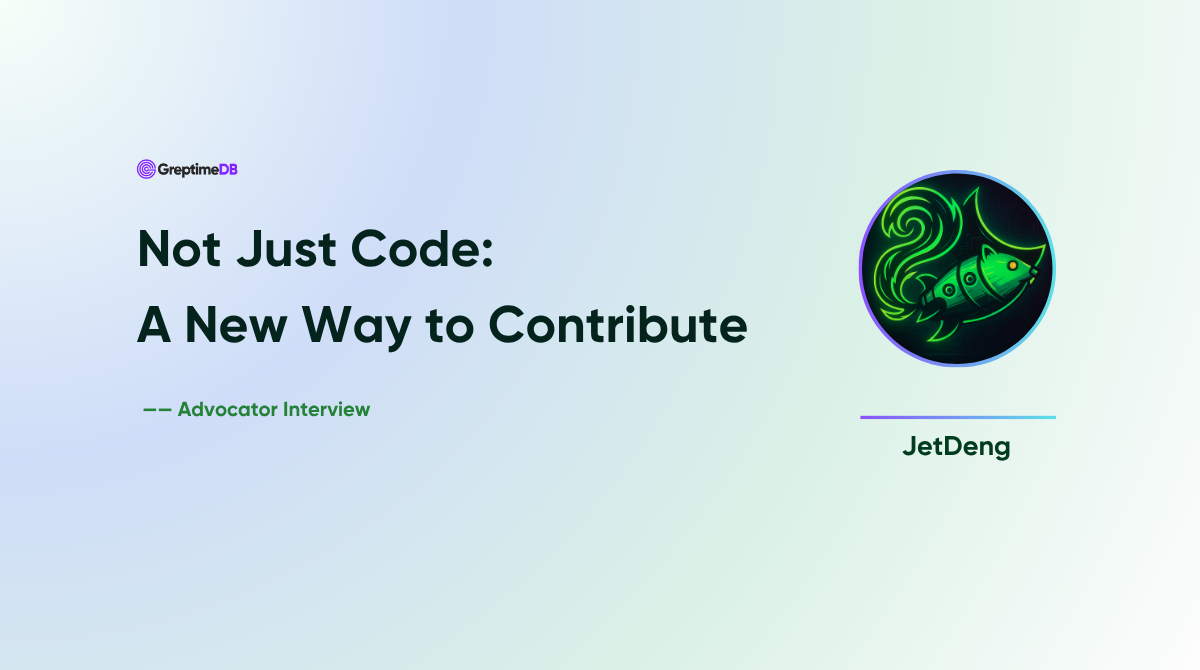Note: This interview was conducted by Yinyong, a core member of the GreptimeDB community (Greptime engineer), alongside community operator Beryl. The narrative perspective is internal to GreptimeDB. The interviewee’s GitHub ID is JetSquirrel, referred to here as JetDeng.
JetDeng, also known as JetSquirrel(GitHub ID), is not your typical open source contributor.

He once submitted a PR and became a GreptimeDB contributor. But afterward, he nearly “vanished” from the community: no more code architecture discussions, no complex Pull Requests. Until one day, he resurfaced with something entirely different. JetDeng had started building creative projects with GreptimeDB and publishing blog posts.
His work revealed a truth often overlooked: open source thrives not just on code, but on creativity and storytelling. JetDeng’s journey—from DevOps engineer to community advocate—proves that ideas, real-world use cases, and a passion for sharing can redefine one’s role in open source.
A Homemade Router and a Spark of Curiosity
JetDeng’s interest in GreptimeDB began with a DIY project. After reading about a user who monitored their home network using the database, he decided to try it himself. What stood out was GreptimeDB’s seamless integration with the Prometheus ecosystem. Later, a social media post about a handcrafted router built by Greptime’s team caught his attention. “They seemed like the kind of people who tinker for fun,” he recalls.
Observability aligned with his professional focus, so he dug deeper. Despite a demanding full-time job, he carved out time to explore time-series databases. GreptimeDB’s domestic roots (eliminating language barriers) and Rust-based architecture intrigued him. Early challenges led him to Greptime’s DevRel team, who encouraged him to start with his strengths: Golang and DevOps. Soon, he submitted his first PR in related Repo.
“The community was welcoming. They didn’t pressure me to deliver groundbreaking code and even mailed me printed documentation!”
This positive response cemented his commitment to the community. Yet, his PRs soon dwindled. During the interview, we finally asked: Why?
ADHD, Open Source, and Rediscovering Purpose
In late 2024, amid burnout from high-pressure work, JetDeng was diagnosed with ADHD. The diagnosis became a turning point. He took a leave of absence, stepped back from traditional work, and turned to open source as a therapeutic outlet.
“I needed to rebuild my rhythm. Open source became my sandbox for experimentation and positive feedback.”
He joined the Amazon Cloud UG as an Ambassador, formed an observability-focused group, and began organizing events. Meanwhile, he channeled his eclectic interests into GreptimeDB projects: visualizing gaming habits, tracking smartwatch heart-rate data, even logging rocket trajectories in Kerbal Space Program. What started as playful tinkering evolved into practical solutions.
“I realized GreptimeDB wasn’t just for hobby projects. It could handle real-world observability tasks.”
He documented his experiments, shared deployment guides, and presented findings at meetups—quietly transitioning from user to evangelist.
From Articles to Action: Bridging Communities
When JetDeng submitted articles about his projects, GreptimeDB shared them on its blog. The collaboration sparked a dialogue.
Soon, he proposed an idea:
“Would GreptimeDB be interested in co-hosting an "observability"-themed meetup in Chengdu?”
The timing aligned perfectly. GreptimeDB had been planning to expand into Southwest, and JetDeng’s local connections helped turn the event into a multi-community success. His role had shifted: no longer just a contributor, but a bridge between developers and users.
This partnership also inspired Greptime’s Advocator Program—a framework to recognize non-code contributions.
What Did He Build with GreptimeDB?
As a DevOps engineer, JetDeng applied GreptimeDB to observability, automation, and security analytics. Recently, he explored integrating the database with large language models (LLMs) via MCP for intelligent log analysis.
“For small-to-medium data workflows, GreptimeDB’s write speed and flexibility are unmatched.”
He also tested it in AI security projects, noting: “Unlike traditional time-series databases, GreptimeDB’s OLAP-like analytics unlock deeper insights.”
“What If I Don’t Code?” Redefining Contribution
We asked JetDeng a question many newcomers pose: “How can I contribute to open source without coding expertise?”
His answer was refreshingly simple: “Document your journey. Your experience is a blueprint for others.”
He shared suggestions for communities:
- Provide “starter kits” (templates, slide decks) to lower barriers for creators.
- Recognize non-code roles: advocates, co-authors, event organizers.
- Encourage non-technical users to share feedback, join events, and engage on social media.
Final Thoughts: Open Source Goes Beyond Code
JetDeng’s story challenges the myth that open source is a code-only club. As he puts it:
"Documenting your experience is invaluable. Share how you use the project—tutorials, case studies, even feedback. That’s open source too."
At Greptime, we believe every voice matters. Whether you write code, docs, or articles—or simply share ideas—you’re building the future of open source. We're looking forward to more advocators like JetDeng to join our community. Let’s make data speak—together.
📬 Join us
👉 Contributor: Submit a PR(Pull Request)
👉 Committer: Deliver consistent, high-quality code
👉 Advocator: Amplify the community through content, events, or creativity







